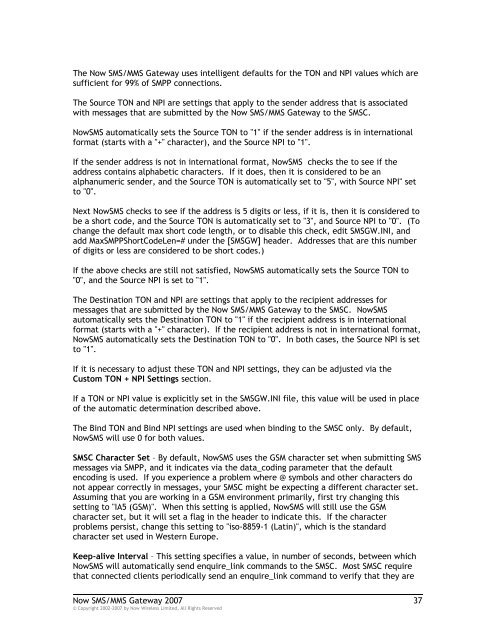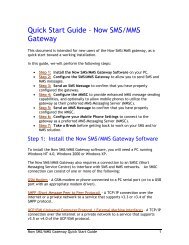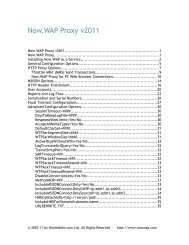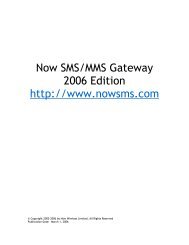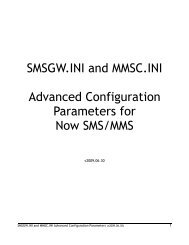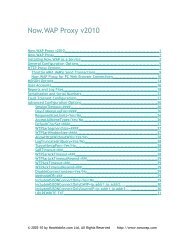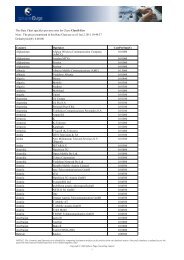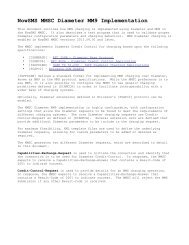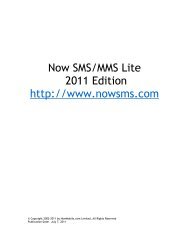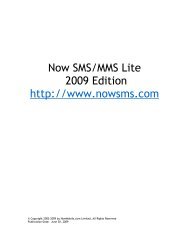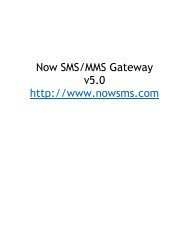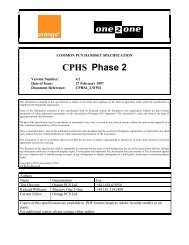You also want an ePaper? Increase the reach of your titles
YUMPU automatically turns print PDFs into web optimized ePapers that Google loves.
The <strong>Now</strong> <strong>SMS</strong>/<strong>MMS</strong> Gateway uses intelligent defaults for the TON and NPI values which are<br />
sufficient for 99% of SMPP connections.<br />
The Source TON and NPI are settings that apply to the sender address that is associated<br />
with messages that are submitted by the <strong>Now</strong> <strong>SMS</strong>/<strong>MMS</strong> Gateway to the <strong>SMS</strong>C.<br />
<strong>Now</strong><strong>SMS</strong> automatically sets the Source TON to "1" if the sender address is in international<br />
format (starts with a "+" character), and the Source NPI to "1".<br />
If the sender address is not in international format, <strong>Now</strong><strong>SMS</strong> checks the to see if the<br />
address contains alphabetic characters. If it does, then it is considered to be an<br />
alphanumeric sender, and the Source TON is automatically set to "5", with Source NPI" set<br />
to "0".<br />
Next <strong>Now</strong><strong>SMS</strong> checks to see if the address is 5 digits or less, if it is, then it is considered to<br />
be a short code, and the Source TON is automatically set to "3", and Source NPI to "0". (To<br />
change the default max short code length, or to disable this check, edit <strong>SMS</strong>GW.INI, and<br />
add MaxSMPPShortCodeLen=# under the [<strong>SMS</strong>GW] header. Addresses that are this number<br />
of digits or less are considered to be short codes.)<br />
If the above checks are still not satisfied, <strong>Now</strong><strong>SMS</strong> automatically sets the Source TON to<br />
"0", and the Source NPI is set to "1".<br />
The Destination TON and NPI are settings that apply to the recipient addresses for<br />
messages that are submitted by the <strong>Now</strong> <strong>SMS</strong>/<strong>MMS</strong> Gateway to the <strong>SMS</strong>C. <strong>Now</strong><strong>SMS</strong><br />
automatically sets the Destination TON to "1" if the recipient address is in international<br />
format (starts with a "+" character). If the recipient address is not in international format,<br />
<strong>Now</strong><strong>SMS</strong> automatically sets the Destination TON to "0". In both cases, the Source NPI is set<br />
to "1".<br />
If it is necessary to adjust these TON and NPI settings, they can be adjusted via the<br />
Custom TON + NPI Settings section.<br />
If a TON or NPI value is explicitly set in the <strong>SMS</strong>GW.INI file, this value will be used in place<br />
of the automatic determination described above.<br />
The Bind TON and Bind NPI settings are used when binding to the <strong>SMS</strong>C only. By default,<br />
<strong>Now</strong><strong>SMS</strong> will use 0 for both values.<br />
<strong>SMS</strong>C Character Set – By default, <strong>Now</strong><strong>SMS</strong> uses the GSM character set when submitting <strong>SMS</strong><br />
messages via SMPP, and it indicates via the data_coding parameter that the default<br />
encoding is used. If you experience a problem where @ symbols and other characters do<br />
not appear correctly in messages, your <strong>SMS</strong>C might be expecting a different character set.<br />
Assuming that you are working in a GSM environment primarily, first try changing this<br />
setting to "IA5 (GSM)". When this setting is applied, <strong>Now</strong><strong>SMS</strong> will still use the GSM<br />
character set, but it will set a flag in the header to indicate this. If the character<br />
problems persist, change this setting to "iso-8859-1 (Latin)", which is the standard<br />
character set used in Western Europe.<br />
Keep-alive Interval – This setting specifies a value, in number of seconds, between which<br />
<strong>Now</strong><strong>SMS</strong> will automatically send enquire_link commands to the <strong>SMS</strong>C. Most <strong>SMS</strong>C require<br />
that connected clients periodically send an enquire_link command to verify that they are<br />
<strong>Now</strong> <strong>SMS</strong>/<strong>MMS</strong> Gateway 2007 37<br />
© Copyright 2002-2007 by <strong>Now</strong> Wireless Limited, All Rights Reserved


